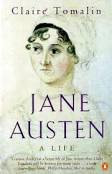
As with many people I have a particular soft spot for Jane Austen. I’m sure literary critics would disagree, but for me she always seems to be the first really modern woman: standing apart, thinking for herself. She’s the first light on the horizon, and it’s deeply depressing it took that many generations of civilization to spawn a lady like her for us to look up to.
Austen was born into a clergyman’s large family. She remained unmarried throughout her life, and was very close to her sister, only finding some measure of success in her writing fairly late. Not that late, however, as she was dead in her early forties. This detailed and well researched biography exploded a couple of preconceptions I had about Austen.
I had always thought her novels, which are fairly narrow in external incident, reflected the placid world in which she grew up. I was surprised to see that in fact the families she knew well were far from dull, with slave owners, madness, adultery, and so forth. Her closest cousin in fact fled the French Revolution and led a most exotic life, taking her retarded child around the world, absolutely none of which appears in her novels. It is interesting to see that the restrained world she created was a conscious artistic choice, rather than a rural spinster’s necessity.
While her novels’ themes are profound and wide reaching, at the level of plot the novels are mostly romances. It is thus easy to believe that Austen must have wanted to be married. From her letters, it is clear that for a while she was much taken with a young Irishman, and that they were not married only because neither had any money. This seems like it could be rather an awful sad story, worthy of a bad movie (step in Anne Hathaway, horrifying casting in BECOMING JANE). However, her sister Cassandra later made it clear that Jane felt a kind of triumph over married ladies, and in one of her letters she speaks of one of her young sister-in-laws as a ‘poor animal’ who will be exhausted by the age of 30. She knew what she was talking about; she lost four sisters-in-law to childbirth. During this period it was normal to have a baby every eighteen months. Thus, for example, one of these sisters-in-law who married at eighteen had eleven babies before dying in labour at the ripe old age of thirty five. From this perspective, the idea of the poor young Irishman seems a good deal less romantic. How could she have found time to think, let alone write some of the finest novels in the English language, if she’d been pregnant and breastfeeding and surrounded by toddlers for twenty years – if she was lucky enough to live that long at all?
I did not expect this to be my response to a biography of Jane Austen, but all I can say is; THANK GOD FOR BIRTH CONTROL.

LOL. I love your candid opinion. It takes much effort, in days past, to be a (woman) writer. I agree with you.